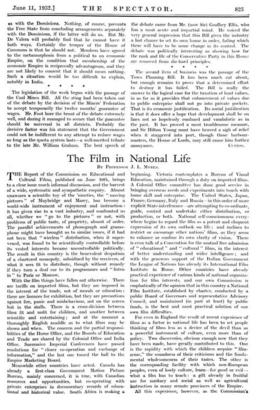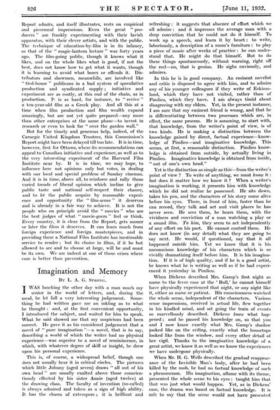The Film in National Life
BY PROFESSOR 3. L. MI RES.
THE Report of the Commission on Educational and 1- Cultural Films, published on June 10th, brings to a clear issue much informal discussion, and the harvest of a wide, systematic and sympathetic enquiry. Almost unawares a scientific toy of the 'nineties, the "moving pictures" of Muybridge and Marcy, has become a world-wide instrument of enjoyment and instruction it has given rise to a vast industry, and confronted us all, whether we "go to the pictures" or not, with problems of public taste, of propriety, almost of order. The parallel achievements of phonograph and gramo- phone might have brought us to similar issues, if it had not been that "wireless distribution, when it super- vened, was found to be scientifically controllable before its vested interests became uncontrollable politically. The result in this country is the benevolent despotism of a chartered monopoly, subsidized by the receivers, of What it sees fit to distribute, though without remedy if they turn a deaf ear to its programmes and "listen in" to Paris or Moscow.
With the film things have fallen out otherwise. There are tariffs on imported films, but they are imposed in the interest of the trade, not of morals or education ; there are licences for exhibition, but they are precautions against fire, panic and misbehaviour, not on the screen but in the stalls. There is a cross-division between films fit and unfit for children, and another between scientific and entertaining ; and at the moment a thoroughly English muddle as to what films may be shown and when. The concern and the partial responsi- bilities of the Home Office, and the Boards of Education and Trade are shared by the Colonial (MEM and India Office. Successive Imperial Conferences have passed resolutions for "closer co-operation and exchange of information," and the last one tossed the ball to the Empire Marketing Board.
Meanwhile other countries have acted. Canada has already a first-class Government Motion Picture Bureau, mainly concerned, it is true, with Canadian resources and opportunities, but co-operating with private enterprises in documentary records of educa- tional and historical value. South Africa is making a beginning. Victoria contemplates a Bureau of Visual Education, maintained through a duty on imported films. A Colonial Office committee has done good service in bringing overseas needs and experiments into touch with home skill and enterprise. The United States, Japan, France, Germany, Italy and Russia—in this order of inure explicit State-interference—are attempting to co-ordinate, guide, control and undertake either distribution, or production, or both. National self-consciousness every- where begins to regard the film as a potent and eloquent expression of its own outlook on life ; and inclines to restrict or encourage other nations' films, as they seem to enhance or confuse its own clarity of vision. There is even talk of a Convention for the mutual free admission of " educational " and "cultural " films, in the interest of better understanding and wider intelligence ; and with the generous support of the Italian Government the League of Nations has already its International Film Institute in Rome. Other countries have already practical experience of various kinds of national organiza- tion for film interests, and our own Commission is emphatically of the opinion that in this country a National Film Institute, established by charter, conducted by a public Board of Governors and representative Advisory Council, and maintained (in part at least) by public funds, is the best and most practical solution of our own film difficulties.
For even in England the result of recent experience of films as a factor in national life has been to set people thinking of films less as a device of the devil than as a powerful instrument of culture, even more than of policy. Two discoveries, obvious enough now that they have been made, have greatly contributed to this. One is the rapidity with which the children acquire "film- sense," the soundness of their criticisms and the funda- mental wholesomeness of their tastes. The other is the corresponding facility with which non-European peoples, even of lowly culture, learn—for good or evil— what a film has to teach : a gift already in fruitful use for sanitary and social as well as agricultural instruction in many remote provinces of the Empire.
All this experience, however, as the Comtnisaion't Report admits, and itself illustrates, rests on empirical and piecemeal impressions. Even the great " pro- ducers " are frankly experimenting with their lavish apparatus, with their clever artists, and with the public. The technique of education-by-film is in its infancy, as that of the "magic-lantern lecture" was forty years ago. The film-going public, though it knows what it likes, and on the whole likes what is good, if not the best, does not know how to get what it wants, though it is learning to avoid what bores or offends it. Dis- tributors and showmen, meanwhile, are involved like " tied-house " publicans in a bad system of speculative production and syndicated supply ; initiative and experiment are as costly, at this end of the chain, as in production. It is as hard, for instance, to " revive " a ten-year-old film as a Greek play. And all this at a time when film production and film wealth expand amazingly, but are not yet quite prepared—any more than other enterprises at the same phase—to invest in research or even to look far "over the garden wall."
But for the timely and generous help, indeed, of the Carnegie United Kingdom Trustees, this Commission's Report might have been delayed till too late. It is in time, however, first for Ottawa, where its recommendations can appeal to Canadian initiative and experience, as well as to the very interesting experiment of the Harvard Film Institute near by. It is in time, we may hope, to influence here not opinions only but votes, in dealing with our local and special problem of Sunday cinemas. And it is in time, above all, to reinforce and rally those varied trends of liberal opinion which incline •to give public taste and national self-respect their chance, and to let the public acquire by reasonable experi- ence and opportunity the " film-sense " it deserves and is already in a fair way to achieve. It is not the people who on principle avoid the " movies " who are the best judges of what " movie-goers " feel or think. Every country, it is clear from the Report, gets sooner or later the films it deserves. It can learn much from foreign experience and foreign masterpieces, and in providing these a National Film Institute has inestimable service to render ; but its choice in films, if it be but allowed to see and to choose at large, will be and must be its own. We are indeed at one of those crises where cure is better than prevention.



































 Previous page
Previous page